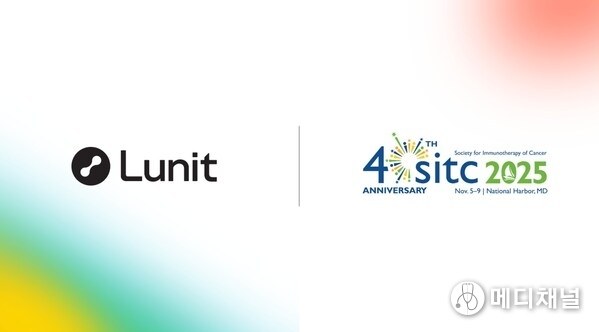
Studies reveal how the Lunit SCOPE® suite identifies immunotherapy-responsive subtypes, standardizes immune phenotyping, and accelerates antibody-based target discovery
SEOUL, South Korea, Nov. 7, 2025 -- Lunit (KRX:328130), a leading provider of AI for cancer diagnostics and precision oncology, today announced the presentation of three studies at the Society for Immunotherapy of Cancer (SITC) 40th Annual Meeting, taking place November 5-9 in Maryland, U.S. The findings highlight how Lunit's AI-powered digital pathology technologies—Lunit SCOPE IO® and Lunit SCOPE® uIHC—can advance precision oncology by uncovering predictive immune signatures and guiding antibody-based drug development.

Lunit and CellCarta presented a comparative analysis demonstrating that AI can standardize tumor immune phenotyping across multiple cancer types, including non-small cell lung, colorectal, and urothelial cancers. When assessing tumor and stromal segmentation, Lunit SCOPE IO showed high concordance with pathologist assessments based on traditional immunohistochemistry (Spearman's correlation coefficients of 0.91 and 0.86). Threshold calibration improved alignment between the AI-based and pathologist scoring of inflamed, excluded, and desert immune phenotypes and improved its reliability and reproducibility. These results position Lunit SCOPE IO as a scalable solution for immune profiling, reducing reliance on additional IHC staining and enabling consistent analysis of the tumor immune microenvironment in both research and clinical practice.
Lunit also introduced new data showcasing the utility of Lunit SCOPE uIHC, the company's AI-powered quantitative IHC platform, in mapping spatial interactions between tumor-infiltrating lymphocytes (TILs) and 74 membrane-specific protein targets currently in development for antibody-based therapies such as antibody-drug conjugates (ADCs) and bispecific T-cell engagers (BiTEs). Analyzing over 47,000 IHC images across 34 cancer types, the study revealed that while most protein targets showed decreased TIL density within expression regions, select proteins such as PD-L1 and TNFRSF4, displayed positive spatial correlation with lymphocyte infiltration. Notably, FGFR4 expression was linked to increased intra-tumoral lymphocytes in colorectal, non-squamous lung, and uterine cancers, suggesting its potential as a BiTE target. The findings demonstrate how Lunit SCOPE uIHC can integrate spatial immune context into early drug discovery workflows, accelerating the identification and validation of therapeutic targets.
In another research, Lunit presented new data confirming the predictive power of AI-based spatial profiling in MET-mutated non-small cell lung cancer (NSCLC), demonstrating how AI-powered image-based profiling can uncover immunologically active subtypes within cancers.
"At SITC 2025, we're showcasing how our digital pathology AI, the Lunit SCOPE suite, can bridge research and real-world clinical practice," said Brandon Suh, CEO of Lunit. "From identifying immunotherapy-responsive subtypes to guiding antibody-based drug discovery, our AI technology is redefining how we understand and target the tumor–immune interface. Collaborations like ours with CellCarta are key to unlocking the full potential of this transformation."
Lunit's featured studies at SITC 2025 include:
- Poster Presentation [#1347]: AI-powered image-based spatial profiling of MET-mutated non-small cell lung cancer identifies immune-active MET exon 14 skipping subtypes as potential immunotherapy targets, Zachary Wallen, Labcorp Oncology
- Poster Presentation [#1264]: Artificial Intelligence-Powered Spatial Analysis of Tumor Microenvironment Identifies Immune Phenotypes in H&E Stained Non-Small Cell Lung Cancer, Colorectal Cancer and Urothelial Cancer, Elizabeth Ross, CellCarta
- Poster Presentation [#1098]: Unveiling spatial correlation between cell surface targets and lymphocytes via artificial intelligence (AI)-powered quantitative immunohistochemistry (IHC) analysis, Sukjun Kim, Lunit
Visit Lunit at booth #818 to learn more about the company's latest innovations in AI-powered digital pathology and oncology research.
About Lunit
Founded in 2013, Lunit (KRX: 328130) is a global leader on a mission to conquer cancer through AI. Our clinically validated solutions span medical imaging, breast health, and biomarker analysis—empowering earlier detection, smarter treatment decisions, and more precise outcomes across the cancer care continuum.
Following the integration of Volpara, Lunit now offers a comprehensive suite spanning risk prediction and early detection to precision oncology. Our FDA-cleared Lunit INSIGHT suite and breast health solutions support cancer screening in thousands of medical institutions worldwide, while Lunit SCOPE platform is used in research partnership with global pharma leaders for biomarker development and companion diagnostics.
Trusted by over 10,000 sites in more than 65 countries, Lunit combines deep medical expertise with continuously evolving datasets to deliver measurable impact—for patients, clinicians, and researchers alike. Headquartered in Seoul with global offices, Lunit is driving the worldwide fight against cancer. Learn more at lunit.io/en.

